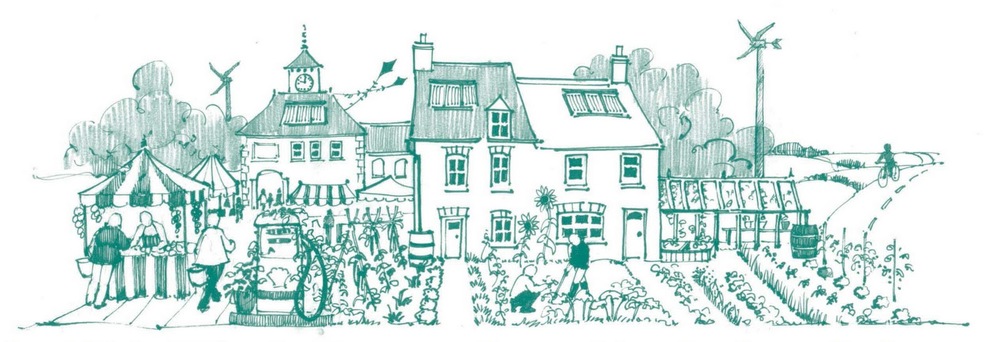Transition Primrose HIll is working with local marine conservation NGO Global Ocean and the Primrose HIll Business Association to make Primrose HIll plastic bag free.
Many local shops already use paper instead of plastic, and many locals take their own bags out with them.
PH Business Association is working on a tote bag for sale through local shops – this will be a limited edition designed by a local artist.
Mary’s Living and Giving is going to host workshops to make bags out of recycled fabric to give away free.
The workshop for children at half term was really popular and made plastic sea creatures for a ‘Camden Aquarium’ to go round the borough to raise awareness of the way that plastic poisons our oceans and all who live in them and depend on them ( which is all of us).
Admire it in the window of Chalk Farm Library and we hope in a shop window in Regents Park Road.
Some of the sea creatures will feature in a ‘stop motion’ short film made by local secondary school pupils with the same aim of raising awareness.
The Camden New Journal did a good article:
http://www.camdennewjournal.com/news/2011/sep/primrose-hill-pledges-bin-plastic-bag
Here is a piece about the dangers of plastic written for us by Global Ocean:
The Dangers of Plastic
What is Bisphenol A BPA?
Plastic contains a chemical called Bisphenol A (BPA or 4,4’-dihydroxy-2,2-diphenylpropane), which is added in the manufacturing process to make rigid plastics and linings of tins.
The chemical is therefore present in many household items including Tupperware, water bottles and baby bottles.
3,175 million tons of BPA are produced annually.
What are the dangers of Bisphenol A?
Some scientists believe that BPA may mimic hormones and interfere with the release of hormones around the body.
Some scientists argue that when BPA interferes with sex hormones, this could affect puberty or menopause and can trigger cancers that are related to hormones.
The ban against BPA argues that the chemical could be contributing to the rise in human illnesses, such as breast cancer, heart disease and genital birth defects.
Evidence?
There is no single study conclusively proves that BPA is harmful to humans because there is a lack of data regarding human exposure to the chemical.
Animal studies have shown that BPA exposure can result in health problems such as:
Metabolic disorders and obesity,
Male fertility problems,
Asthma and intestinal inflammation,
Breast and prostate cancer,
Liver disease,
And a potential impact on brain function
In 2010 research on 2,948 adults found that BPA exposure is “consistently associated with reported heart disease in the general adult population of the USA”. This research was used in the review of the EU policy on BPA.
http://www.nhs.uk/news/2010/03March/Pages/BPA-plastic-health-warnings.aspx
Young children and infants have the highest levels of exposure to BPA as they are less able to clear this chemical from their bodies.
http://www.independent.co.uk/life-style/health-and-families/health-news/investigation-scandal-of-danger-chemical-in-baby-bottles-1931628.html
Law
In the EU and Canada, BPA use is banned in baby bottles
If it is regarded as unsafe for baby bottles, then surely it should be unsafe for all humans.
BPA free bottles
There are concerns that BPA products are still not safe.
http://www.independent.co.uk/life-style/health-and-families/is-bpafree-plastic-really-safe-2242207.html
Many BPA-free plastics release other chemicals that mimic estrogen, researchers claim.
A US research team in 2011 found that 92 percent of the BPA-free consumer products they tested released potentially hazardous compounds after undergoing wear and tear, such as through dishwashing, microwaving, or exposure to sunlight.
Impact on Marine Life
http://www.independent.co.uk/news/science/scientists-uncover-new-ocean-threat-from-plastics-1774337.html
There is a body of plastic waste the size of Texas, floating in the Pacific.
Plastic waste in the Ocean is a mammoth cause of marine pollution.
As plastics decompose in the sea, they are exposed to the rain, sun (photo-degradation) and other environmental conditions. They then release potentially toxic substances, which could affect the growth and development of marine organisms that mistake the plastic pellets for food.
Samples of seawater collected from the Pacific Ocean were found to be contaminated with up to 150 parts per million, with components of plastic decomposition, thus proving a new type of micro-pollution.
Conclusions
Plastics whether they are BPA-free or not may pose a threat to health, so the best thing to do is cut down on our use of plastic.
o Stay away from receipts and carbonless paper, which often contain BPA. If you handle a large amount of receipts, wash your hands often and try wearing gloves.
- Avoid drinking canned sodas or beers and opt for glass bottles.
- Opt for bottled waters and other plastics with the recycling labels #1, #2 and #4 on the bottom and avoid #7, which are usually made with polycarbonate (PC) plastics.
- Do not microwave plastics, either BPA or BPA-free, and don’t leave your plastics sitting in the sunlight.
